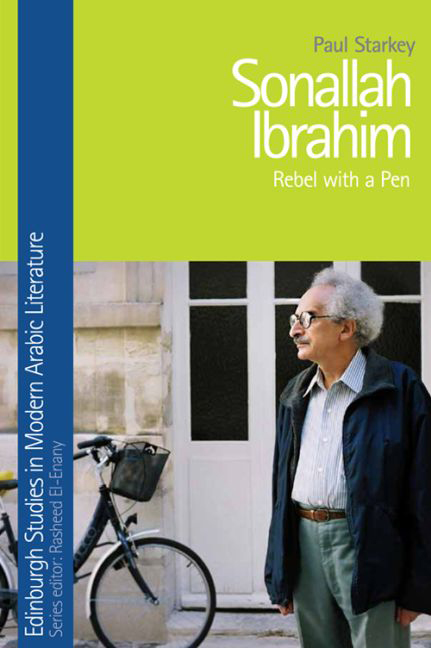Book contents
- Frontmatter
- Contents
- Series Editor's Foreword
- Preface
- 1 Introduction: Background and Context
- 2 Rebel with a Pen
- 3 Cairo Prison: Tilka al-raʾiha (1966)
- 4 Michelangelo and the Dam: Najmat Aghustus (1974)
- 5 CocaColaland: al-Lajna (1981)
- 6 War in Lebanon: Bayrut, Bayrut (1984)
- 7 Consumer Society: Dhat (1992)
- 8 Prison of Dishonour: Sharaf (1997)
- 9 Widening Horizons (1): Sex, Memory and Revolution: Warda (2000)
- 10 Widening Horizons (2): In the Land of the Capitalists: Amrikanli (Amri Kan Li) (2003)
- 11 Return to Childhood: al-Talassus (2007)
- 12 The French Connection: al-ʿImama wa-al-Qubbaʿa (2008) and al-Qanun al-Faransi (2008)
- 13 Filling a Gap: al-Jalid (2011)
- 14 Epilogue
- Bibliography
- Index
5 - CocaColaland: al-Lajna (1981)
Published online by Cambridge University Press: 23 September 2017
- Frontmatter
- Contents
- Series Editor's Foreword
- Preface
- 1 Introduction: Background and Context
- 2 Rebel with a Pen
- 3 Cairo Prison: Tilka al-raʾiha (1966)
- 4 Michelangelo and the Dam: Najmat Aghustus (1974)
- 5 CocaColaland: al-Lajna (1981)
- 6 War in Lebanon: Bayrut, Bayrut (1984)
- 7 Consumer Society: Dhat (1992)
- 8 Prison of Dishonour: Sharaf (1997)
- 9 Widening Horizons (1): Sex, Memory and Revolution: Warda (2000)
- 10 Widening Horizons (2): In the Land of the Capitalists: Amrikanli (Amri Kan Li) (2003)
- 11 Return to Childhood: al-Talassus (2007)
- 12 The French Connection: al-ʿImama wa-al-Qubbaʿa (2008) and al-Qanun al-Faransi (2008)
- 13 Filling a Gap: al-Jalid (2011)
- 14 Epilogue
- Bibliography
- Index
Summary
Sonallah Ibrahim's third published novel, al-Lajna (The Committee; 1981), is regarded by many critics as his most successful work to date. In terms of length and overall conception, it has more in common with Tilka al-Ra ʾiha than with Najmat Aghustus, being constructed on a rather small scale, with little, if any, of the expansiveness of the latter work. Indeed, it arguably has more in common with Tilka al-Ra ʾiha than with any other of the author's works, both because of its comparatively short length (it covers only a little over a hundred pages of print, or some 25,000 words) and also because of certain stylistic characteristics (as well as some of the general social and political ambience) that it shares with the earlier work.
Publication and Translations
The first chapter of the novel, which describes the narrator's initial confrontation with the Committee (‘lajna’) from which the book takes its name, originally appeared as a self-contained short piece in the magazine al-Fikr al-Mu ʿasir (Contemporary Thought) in May 1979, some two years before the publication of the full work. The complete work was published in Beirut by Dar al-Kalima in 1981 and reissued in Cairo the following year (1982) by Matbuʿat al-Qahira; it has since gone through numerous editions, being reprinted or republished not only in Cairo and Beirut but also in Tunis and Marrakesh. In addition to the English translation by May St Germain and Charlene Constable, the work has been translated into French, German and a number of other European languages.
Background
As it is impossible to appreciate the thrust of Sonallah Ibrahim's satire in al-Lajna without some knowledge of the Egyptian economic and political context, it will be necessary to sketch the background to the work in some detail. Thematically, the novel represents an important new stage in the author's writing career, for the most conspicuous element is provided by the author's comments on President Anwar Sadat [al-Sādāt]’ s policy of infitāª (‘opening [up]’) – the term used to designate the ‘open-door’ economic policy of President Sadat, which, together with his policy of rapprochement with Israel, was to become one of the principal targets of political criticism not only for Sonallah Ibrahim but also for many other writers and intellectuals of his generation.
- Type
- Chapter
- Information
- Sonallah IbrahimRebel with a Pen, pp. 69 - 85Publisher: Edinburgh University PressPrint publication year: 2016



